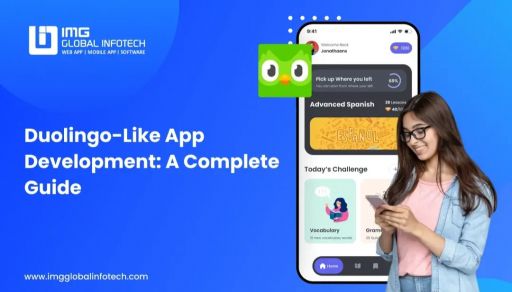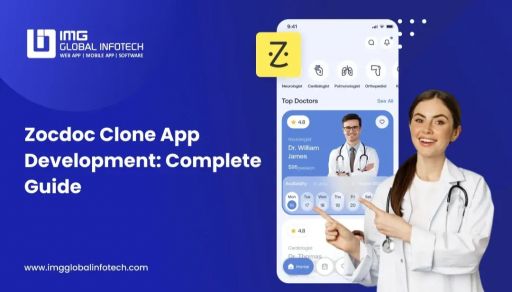React Native Vs Flutter: Which Is Better For App Development In 2026?
Mohit Mittal
Jul 22, 2025
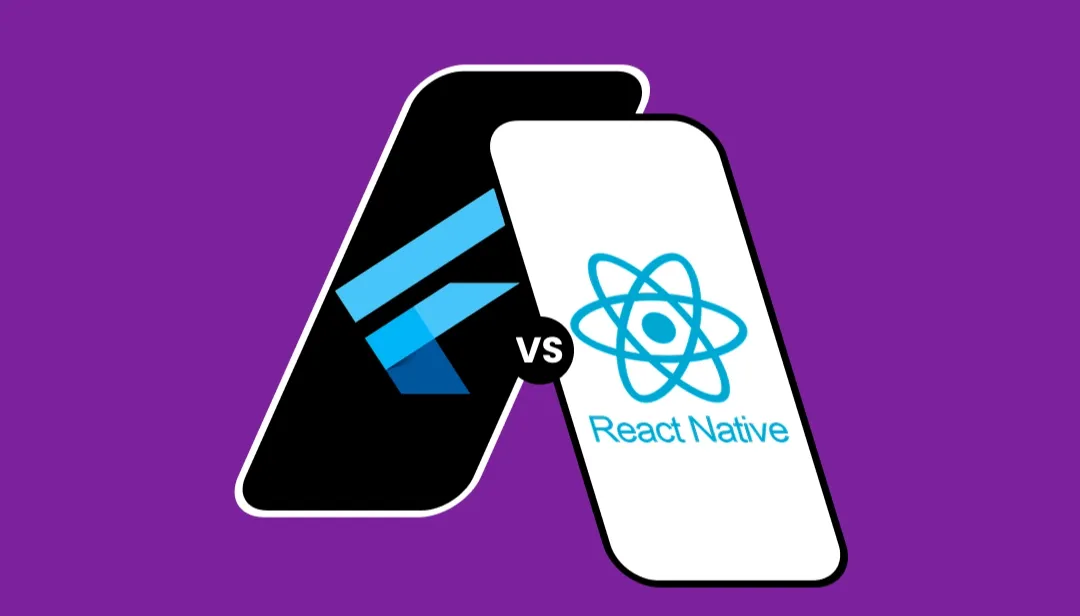
In today's digital landscape, proper mobile app development framework selection is critical for business success. With so many choices available in today's market, React Native and Flutter are the leading frameworks for cross-platform app development. Both frameworks are powerful application development tools that help developers build high-quality, highly performant, maintainable applications with a single codebase. As we move toward 2026, both React Native and Flutter are continuing to grow and enhance already great features. Both frameworks have strong community support and performance continues to improve. So, which framework has the potential to serve your app development project better? In this important deep dive blog post, we will provide a comprehensive comparison of React Native and Flutter, including the pros and cons of each framework, development experience, performance, market forces, and future direction.
What is React Native?
React Native is an open-source framework developed by Meta (previously Facebook) that allows developers to build mobile applications using JavaScript and React. Developers have the ability to develop a single codebase app that works on both iOS and Android. Choosing React Native is a way for developers to expedite their development process, and consequently, also reduce costs. React Native provides the opportunity to use native components, which allows it to perform close to native applications. Aspects such as live reload, reusable code, and expansive developer community have contributed to its widespread popularity with companies that are attempting to build fast and responsive mobile applications across platforms.
What is Flutter?
Flutter is an open-source UI software development kit created by Google to foster the rapid development of natively compiled applications for mobile, web, and desktop from a single code base. It is built on the Dart programming language and has a comprehensive set of pre-designed widgets (material design, etc), giving developers a high degree of performance and flexibility. The hot reload feature of Flutter allows changes to the code to be made in real-time allowing changes to be visualized and applied immediately. Flutter is recognized for its smooth animations and headers, customizable UI, and is considered one of the top frameworks due to its rapid development of visually stunning and consistent-looking applications across platforms.
React Native vs Flutter: A Feature-by-Feature Comparison
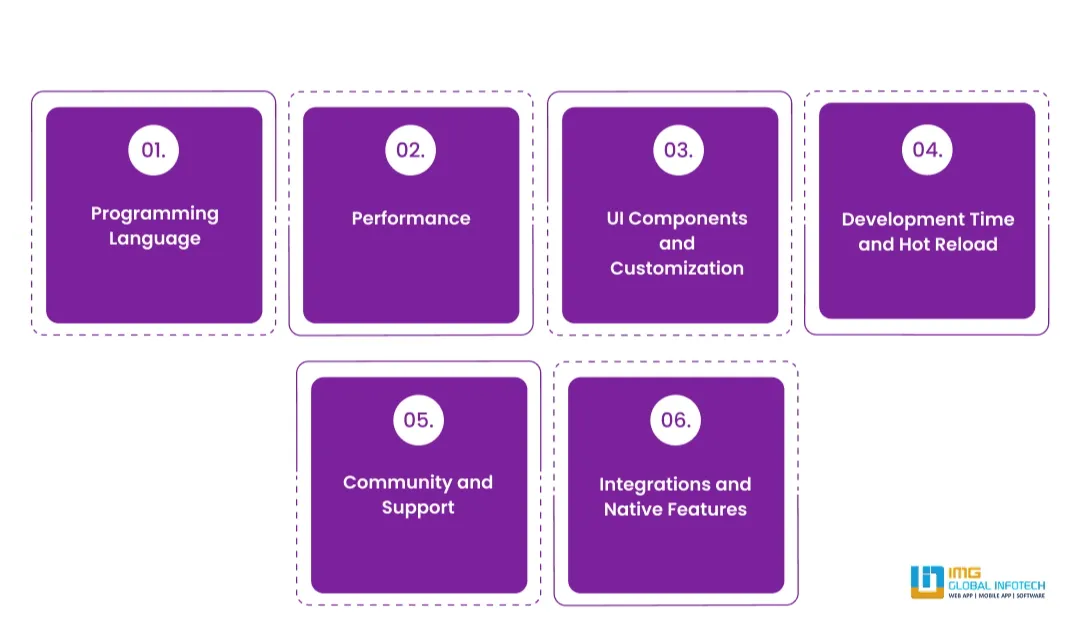
React Native vs Flutter performance are two of the most widely used frameworks when developing apps for device platforms. Both frameworks are created to help React Native app development company form applications quickly and get to market in less time but they differ greatly when it comes to architecture, performance, and overall experience when developing an app. Below is a comprehensive comparison of React Native vs Flutter performance side-by-side, feature-by-feature.
1. Programming Language
-
React Native uses JavaScript which is one of the most commonly used and easiest programming languages to learn for a beginner. This has helped many developers working in web development to transition quickly.
-
Flutter utilizes Dart, a programming language developed by Google. Dart is an efficient and fast programming language but has a smaller developer community, tending to cause a steep learning curve for newcomers.
2. Performance
-
Flutter provides near-native performance due to its compiled state and direct interaction with device's native components.
-
React Native provides good performance but uses a JavaScript bridge to reach native modules, sometimes causing slight performance lag with more complex animations or apps.
3. UI Components and Customization
-
Flutter prepares usage of many customizable widgets and uses a consistent UI approach within its supported platforms. For added satisfaction, Flutter allows developers to fully customize every pixel on the screen, making beautiful designs possible.
-
React Native provides usage of native components that keep the app looking and feeling native, but sometimes requires third-party libraries or custom modules to customize advanced UI features.
4. Development Time and Hot Reload
-
Both development frameworks support Hot Reload and are tailored for the web application development experience. Hot reload enables top mobile app development companies to see the changes they made in the codebase of an application immediately, with the ability to view changes without needing to build the app. Flutter's hot reload feature is faster and far more stable than React Native.
-
React Native does benefit from allowing the developer to take advantage of being able to use JavaScript and its complete ecosystem of libraries, including a multitude of existing React Native libraries, that can save considerable time when developing applications with common features.
5. Community and Support
-
React Native enjoys a more developed, established ecosystem, Needing support from Meta, an extensive community, complete documentation, and third-party plugins.
-
Flutter is a newer, rapidly growing framework with the power of Google backing it. Developers are increasingly drawn to Flutter because of its modern UI approach to mobile app development.
6. Integrations and Native Features
-
React Native clearly provides easier to implement integrations with native modules, especially if you're building an application that relies heavily on device-specific functionality.
-
Flutter allows you to speak to native access through plugins, but custom platform-specific code may be required to connect with some native APIs.
Conclusion
React Native vs Flutter performance have significant pros and cons. Generally speaking, React Native suits app development for fast to market applications (and has tremendous community support), while Flutter suits app development for high performance, visually rich applications. It ultimately depends on project need, team expertise, and the experience you want the end user to have.
Related Blog - How To Build A React Native Mobile App
Flutter Vs React Native: Which Is Better Flutter Or React Native?
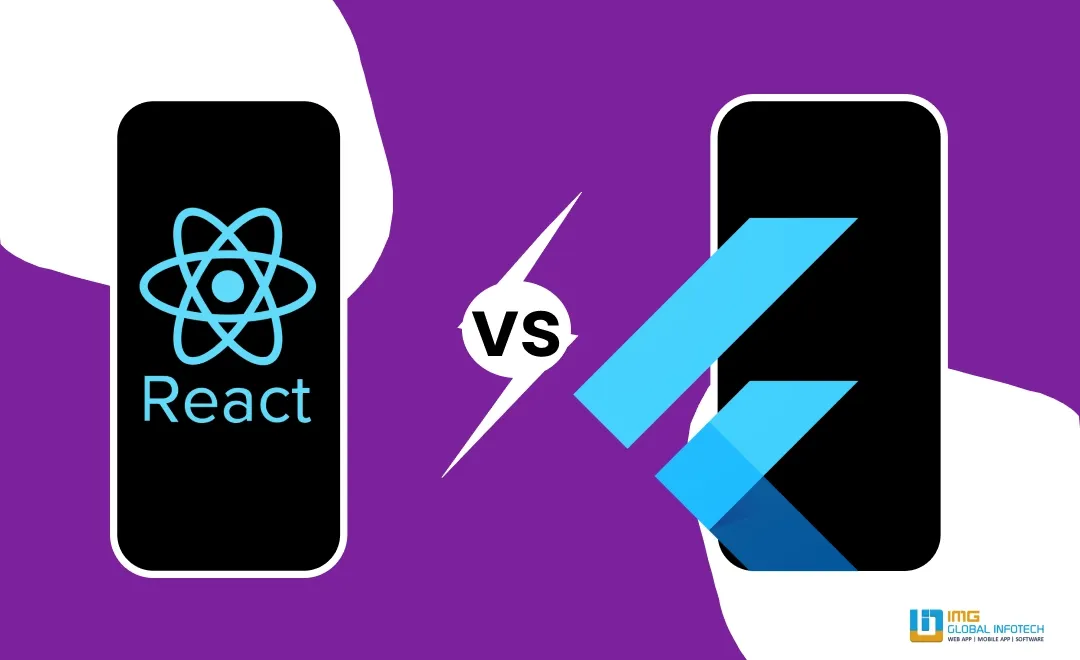
Deciding between React Native vs Flutter 2026 will ultimately depend on your project needs. Flutter is best for developing applications with custom user interfaces that are visually rich with smooth animations, making it an excellent option for a startup and MVP with a design perspective. Its one codebase works easily in the same way across all platforms and web and desktop.
React Native however has an advantage on projects with a need for lightning speed of development, native-like performance and access to third party libraries easier. React Native works well for apps with constrained timeframes to get to market, apps with high community support, or apps with extensive tooling in existing JS codebases. For Enterprise apps, React Native may have more flexibility with respect to native integrations while Flutter has a more consistent UI experience across platforms.
Overall, Flutter is better when it comes to keeping a consistent design, while React Native is better when it comes to scalability or rapid development—both frameworks excel depending on the use case.
Also Read - Top 10 Flutter App Development Companies
React Native vs Flutter: Developer Experience in 2026
A feature-based comparison of the developer experience of the React Native and Flutter frameworks in 2026:
Learning Curve
React Native is based on JavaScript, which many developers know, particularly those with a web development background. Flutter is based on Dart, which is not as known (and hence a little more challenging for beginners).
Tooling and IDE Support
Both frameworks have great tooling with respect to how well they integrate to popular IDEs. React Native works well with Visual Studio Code (VS Code) and has almost unlimited potential with all of the JavaScript Debugging and performance tools that can be hooked into it. Flutter also works well with VS Code and Android Studio--with virtually seamless integrated development of customized - widget rendering out of the box and built-in debugging tool.
Hot Reload and Development Speed
Flutter stands strong with a quicker and more reliable hot reload in 2026. Hot reloads improve efficiency when developing UIs. React Native has made improvements to their hot reload, however, they still struggle with state retention in some cases.
Documentation and Community Support
React Native has the advantage of a much larger and mature community, with a huge number of third-party libraries, community support, and forums/information to help solve development problems. In 2026, Flutter has developed a community of their own that has grown extremely quickly as it has become popular among designers and mobile-first startups. Flutter's official documentation is still more organized and generally easier to read for beginners than React Native.
Third Party Plugins and Native Module Integration
React Native has a more extensive plugin ecosystem than Flutter because it has had a significant head start with a community that has become familiar with developing plugins. The process for launching a project in React Native with existing Java/Swift in the native module or native app is seamless. Flutter has made significant improvements to the plugin system as of 2026, reduced the time to develop third-party plugins, and added enhancements to platform channels; however, there are cases where the React Native or Flutter for startups will need to create their own bridge for less common or niche features.
Code Reuse and Cross-Platform Capabilities
With Flutter, the code across different platforms, including web and desktop, can share a code base without the need to use native UI elements for cross-platform apps. Code reuse with React Native is roughly equal to Flutter in mobile apps, but extensive work will most-likely be to match the UI behavior across both platforms.
User Interface Development And Customization.
Flutter developed a declarative UI as well as its own library of widgets that allow extremely detailed customization and control of the application interface. React Native depends on native components and will likely need one of the many external libraries (like React Native Elements or NativeBase), if not more than one, if you want to customize your app extensively.
CI/CD and Testing Support
Flutter provides natively supported unit, widget, and integration testing as well as easy setup for a CI/CD pipeline. React Native provides similar capabilities but the process of setting up testing can change depending on the libraries you use.
Overall Developer Satisfaction: Flutter vs React Native
In 2026, Flutter app development services will prefer Flutter as the front-end for UI-heavy applications with consistent design; while React Native would remain user preference for applications that are being built with a faster go to market time, or already existing web stack.
Cost Comparison: Flutter vs React Native Development
When comparing Flutter vs React Native for cross-platform app development, the cost of development is obviously an important factor. Both frameworks have developed a reputation for reducing total costs of development, by having the benefit of a single code base for more than one platform, but the differences can be subtler than they initially seem, and could sway total costs.
1. Development Cost
React Native vs Flutter 2026 both can save you money compared to native, and since one code base does both iOS and Android, you can realistically save approximately 30-40%, in terms of development costs. Flutter also has the potential to be slightly more productive than React Native due to its rich libraries of widgets available, and stable hot reload which ultimately can reduce development hours.
2. Developer Availability & Hourly Rates
React Native developers are available all over the place due to the increased popularity of the programming language JavaScript. The average hourly rates for React Native developers range from $20 to $70/hour depending on the experience of the developer and location as of 2026. Flutter Developer average hourly rates are on par with the React Native developers averaging $25 to $75/hour especially when the developer had experience with Dart and complex built-outs in UI.
3. Maintenance and Updates
Though both frameworks are somewhat similar to maintain, Flutter has a persistent UI across platforms which likely leads to fewer platform specific issues and therefore would reduce their long term Mobile App Maintenance Cost. While React Native can also be robust, they sometimes involve some additional debugging and potentially even third party module updates, as you may encounter bugs with the dependencies that are newer and untested, thus incurring a slightly increased maintenance cost.
4. Time-To-Market
Greater speed in development will translate into decreased time-to-market, and thus functionality to generate revenue sooner. Flutter has a widget-based UI which makes it more efficient, especially with UI heavy Apps, while React Native has its strengths in apps that have web integrations or leverage third-party APIs.
Market Trends And Future Scope Of Best Framework For App Development 2026
Increased Popularity
With Flutter holding 46% share and React Native holding 32% of the global cross-platform development market share as of 2026: Statista lists both technologies as the most dominant for their market.
Developer Adoption
A 2026 Stack Overflow survey indicates that 12.6% of professional developers use Flutter, while React Native has 11.2%, showing great interest in both frameworks among developers.
Job Market Effectiveness
Job postings for React Native/Firebase and Flutter developers are increasing globally year-on-year by 28% in 2023, with increased demand seen in North America, Europe, and India.
Community Engagement
Flutter has earned over 175K stars on GitHub and React Native now shows over 115K stars, showing continuous engagement and community-backed improvements.
Adoption Rates
More than 40% of startups have chosen Flutter and over 25% of enterprises; these were mainly related to performance and UI capabilities. Flutter app development vs React Native remained popular for firms seeking to integrate a hybrid of web and mobile platforms.
Cost / Time
Businesses using cross-platform frameworks like Flutter and React Native are noting development savings of 35 - 40% in cost and time, according to a 2026 Deloitte technology efficiency report.
Why Choose IMG Global Infotech For Best Framework For App Development 2026?
IMG Global Infotech is a reliable and dependable partner for Cross-platform app development 2026 for high-performance, scalable and user-focused mobile solutions. Our Best framework for app development 2026 team consists of skilful developers skilled in React Native, Flutter and Xamarin, with strong experience and success across the two main targets: iOS and Android; to ensure seamless operation across both platforms with only one coding platform. IMG Global Infotech is here to assist and provide the opportunity, tailored plans in partnership with businesses commencing from Startup to Enterprise to create future-ready mobile solutions that is unique to each organisation goals; speed, consistency, and user experience.
Conclusion
In conclusion, we summarised the two great technologies as useful frameworks for cross-platform mobile app development in 2026. React Native is advantageous for faster development and has a wide ecosystem for JavaScript framework, therefore works well for projects that require native integration. Flutter is advantageous for app performance; the ability to use the UI as part of a custom platform and provides an app experience that is consistent and customizable across all platforms. The best framework to select will depend on the required goals, expected effectiveness, hire dedicated mobile app developer expertise, and their design needs. By reviewing these components, any business should proceed with confidence in selecting the best framework suited in which is efficient, scalable, and engaging mobile applications.
-
 Top Truck Booking App Development Company for Logistics Businesses
Top Truck Booking App Development Company for Logistics Businesses
-
 How Much Does It Cost to Hire Hybrid App Developers in 2026?
How Much Does It Cost to Hire Hybrid App Developers in 2026?
-
 How Much Does Truck Booking App Development Cost in 2026?
How Much Does Truck Booking App Development Cost in 2026?
-
 How to Build a Truck Booking App: Step-by-Step Development Guide
How to Build a Truck Booking App: Step-by-Step Development Guide
-
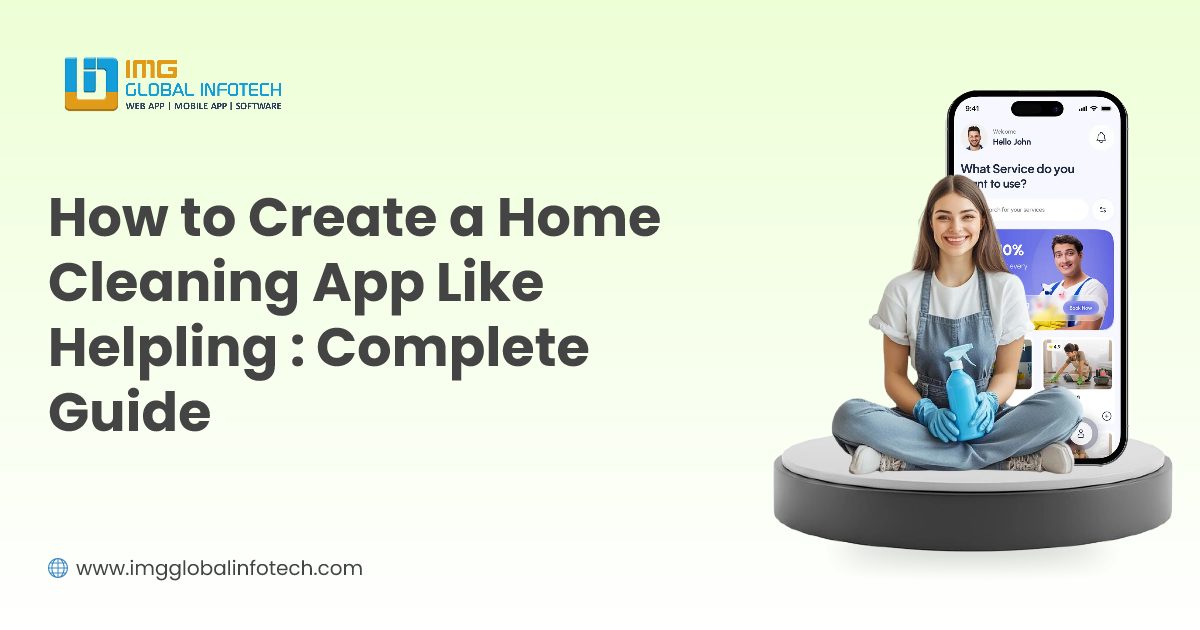 How to Create a Home Cleaning App Like Helpling : Complete Guide
How to Create a Home Cleaning App Like Helpling : Complete Guide
-
 Top 10 Flower Delivery Apps in 2026
Top 10 Flower Delivery Apps in 2026
Mohit Mittal is the co-founder of a leading IT company with over a decade of experience in driving digital transformation and innovative tech solutions. With a strong background in software development, Mobile app development, E-commerce, business strategy, and team leadership, Mohit Mittal is passionate about helping businesses scale through technology. When not solving complex tech challenges, he enjoys sharing insights on emerging trends, entrepreneurship, and the future of IT.


